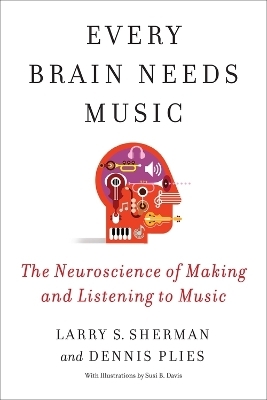
Every Brain Needs Music
Columbia University Press (Verlag)
978-0-231-20910-6 (ISBN)
Whenever a person engages with music—when a piano student practices a scale, a jazz saxophonist riffs on a melody, a teenager sobs to a sad song, or a wedding guest gets down on the dance floor—countless neurons are firing. Playing an instrument requires all of the resources of the nervous system, including cognitive, sensory, and motor functions. Composition and improvisation are remarkable demonstrations of the brain’s capacity for creativity. Something as seemingly simple as listening to a tune involves mental faculties most of us don’t even realize we have.
Larry S. Sherman, a neuroscientist and lifelong musician, and Dennis Plies, a professional musician and teacher, collaborate to show how our brains and music work in harmony. They consider music in all the ways we encounter it—teaching, learning, practicing, listening, composing, improvising, and performing—in terms of neuroscience as well as music pedagogy, showing how the brain functions and even changes in the process. Every Brain Needs Music draws on leading behavioral, cellular, and molecular neuroscience research as well as surveys of more than a hundred musical people. It provides new perspectives on learning to play, teaching, how to practice and perform, the ways we react to music, and why the brain benefits from musical experiences.
Written for both musical and nonmusical people, including newcomers to brain science, this book is a lively and easy-to-read exploration of the neuroscience of music and its significance in our lives.
Larry S. Sherman is a professor of neuroscience at the Oregon Health and Science University. An enthusiastic piano player since age four, he has published widely on brain development, aging, and disease, and given lectures on music and the brain throughout the world. Dennis Plies, who was for many years a music professor at Warner Pacific University, has been involved with music for his entire life. Starting at the age of seven, he played marimba for audiences and on television, and he has recorded albums in genres including gospel, classical, and jazz. Susi B. Davis began painting watercolors in her early teens. She continues to paint in watercolors and acrylics in her studio in Portland, Oregon, where she also teaches painting. She has previously illustrated several books, including children’s books about animals and a hiking guide featuring flowers and plants in the Pacific Northwest.
Prelude
Overture
1. What Is Music, and Why Does It Exist?
2. How Your Brain Composes Music
3. Practicing Music, Part I: The Partnership of Motivated Music Students and Motivated Music Teachers
4. Practicing Music, Part II: Understanding the Neuroscience
5. Practicing Music, Part III: Changing Your Brain to Get It Right
6. How Your Brain Performs Music
7. How Your Brain Listens to Music
8. Why Your Brain Likes Music
Coda: The Final Jam with Dennis and Larry—Reflective Improvisation
Acknowledgments
Appendix A: First Survey
Appendix B: Second Survey
Notes
Bibliography
Index
| Erscheinungsdatum | 13.03.2023 |
|---|---|
| Illustrationen | Susi Davis |
| Zusatzinfo | 62 figures |
| Verlagsort | New York |
| Sprache | englisch |
| Maße | 140 x 216 mm |
| Themenwelt | Kunst / Musik / Theater ► Musik ► Musiktheorie / Musiklehre |
| Naturwissenschaften ► Biologie ► Humanbiologie | |
| Naturwissenschaften ► Biologie ► Zoologie | |
| ISBN-10 | 0-231-20910-X / 023120910X |
| ISBN-13 | 978-0-231-20910-6 / 9780231209106 |
| Zustand | Neuware |
| Haben Sie eine Frage zum Produkt? |
aus dem Bereich


